This story is written with a different flair than my usual. It was my first attempt to jot down a thriller novel with interconnected stories centered around my hometown Katwa.
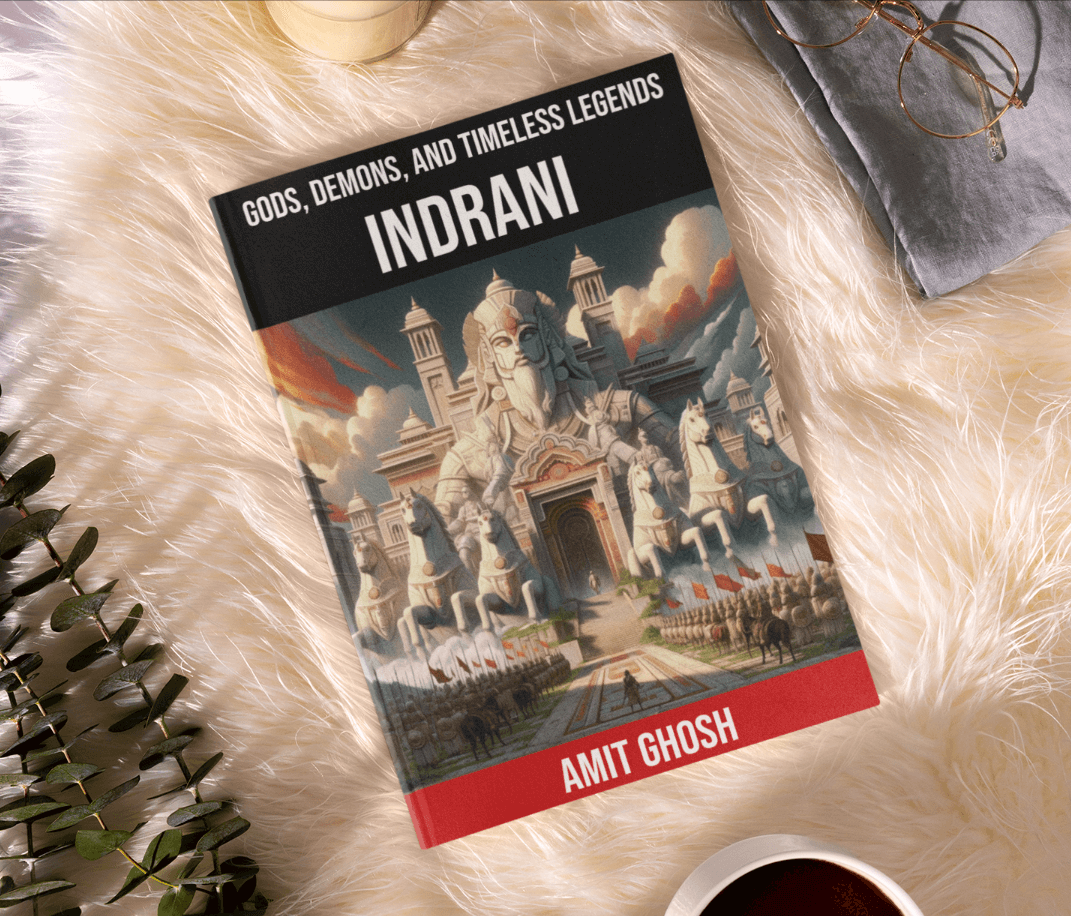
The tales of legendary figures have long captivated me. So, using inspiration from the Puranas and the histories, I set out to compose my own fairy tales.
I wanted to create magical worlds and characters that would captivate readers of all ages with their timeless themes and lessons. The neighborhood of Katwa was originally founded as Indrani Pargana, and it was said to have been built by Devi Indrani herself. Over time, the name evolved from Kantak Nagari to its final form, Katwa. I never like prefaces myself. So, let’s keep it short.
Tilotamma is the first story written in the Novel.
- If you like it, You may jump out and check it out on Amazon for the rest of the stories.
- To add, I’ve never written anything for Wattpad before. I’ve planned to release the stories one by one slowly. That is the reason behind the shift in the language’s style. Check it out on Wattpad.
Tale
Once upon a time, according to the Padma Purana, there was a woman named Kubja.
After the maddening fever claimed her husband, it left Kubja with blisters that distorted her appearance, casting her into the role of an outcast, her existence tethered to the outskirts, where village chatter seldom reached.
She lived at the very end of the village in a tiny hut made of leaves, a fragile shelter that was both her home and her hiding place from the world. This humble abode, barely standing against the winds and rains, was Kubja’s sanctuary, far removed from the heart of the village where laughter and warmth were shared among its inhabitants.
The villagers often mocked her. Their words, sharp and unyielding, were like stones thrown at her dignity. “There goes the cursed widow,” they would whisper, loud enough for her to hear, as she passed by with her head lowered, not daring to meet their eyes.
Some were fearful that she would steal their luck away, crossing paths with her only to quickly avert their gaze, as if a mere glance could transfer her misfortune to them. This superstition wrapped Kubja in a cloak of solitude, making her an unwelcome shadow in her own village.
Today, a rare spark of joy lit up Kubja’s eyes, for the calendar had turned its pages to the day of Makar Sankranti, a festival held in the heart of mid-January, celebrated across the vast expanse of India. This festival was special because it marked the end of winter and the start of longer, sunnier days. But the soul of Makar Sankranti lay in something far smaller yet immensely significant—the sesame seeds.
These tiny seeds, according to ancient beliefs, were not mere plants but divine gifts, believed to have originated from none other than Lord Vishnu himself. Considered to be embodiments of purity and fortune, these seeds carried within them a piece of the divine. It was said that to hold a sesame seed was to hold a fragment of Lord Vishnu’s essence. Thus, on this auspicious day, sesame seeds became central to every ritual, every offering made in hopes of securing blessings.
Kubja’s lineage was rooted in the ancient wisdom of Ayurveda, with her grandfather revered as a sage of this venerable science. Her father, bridging the ancestral wisdom with the modern world, carved a niche for himself as a prosperous businessman, his fortunes rising from the golden seas of sesame oil. The extraction and sale of this oil, revered not just for its culinary uses but also for its sacred and medicinal properties, marked a day of great significance for their family.
It was a tradition, deeply entwined with the rhythms of their lives, that on Makar Sankranti, their home opened its doors wide, becoming a hub of communal harmony. The chatter and laughter of the entire village, converging in their courtyard to partake in the feast, still echoed in her memories.
Her father’s prosperity had once painted their lives with the hues of abundance and joy. However, fate took a tragic turn on a day that had started like any other, with her family embarking on a pilgrimage to Puri, a journey meant to offer prayers and seek blessings.
They never returned, swallowed by the fierce storms for which Odisha is notoriously unforgiving. It was whispered that the tempest had claimed them, a family vanished as if they had never been, leaving behind only whispers of what might have happened. Kubja, merely eight years old at the time, was left in the care of her grandmother, the only anchor in her suddenly storm-tossed world.
Years had passed, but there were moments, like tonight, under the starlit canopy of the sky, when Kubja would sigh and look up, her eyes searching, perhaps, for more than just the twinkling lights above. Maybe, in the quiet communion with the night, she sought a connection with her grandmother, a guiding star in the vast, dark expanse, hoping to find in those silent watchers a trace of the love and security that had been so abruptly torn from her life.
Kubja hailed from a family of affluence and high caste, deeply entrenched in both business and Brahmin traditions, whereas her love belonged to a Dom. Doms are caretakers of the cremation grounds and the main keepers of the fire that lights the pyres, a lineage viewed with the utmost social disdain. Their union faced stern disapproval from the community. Despite the stark lines of caste that divided them, they shared a love as pure. Their union, a testament to love’s power, was tragically short-lived; her husband succumbed to the merciless fever.
In the wake of his passing, his family, fueled by grief and bound by prejudice, turned against her. But beneath the surface of their scorn lay a more insidious motive—a tactic to seize her father’s and family’s wealth, an inheritance now vulnerable and ripe for plunder. His sister, leading the charge with cold fury, forcefully expelled Kubja from the home they once shared, casting her to the fringes of the village. Stricken by the same illness that claimed her husband, Kubja was left frail and voiceless, her body wracked with the relentless ache of the fever’s aftermath.
Resting on the banks of the Ganga, lost in memories of days gone by, Kubja cut a lone figure against the backdrop of dust and time.
A tear wound its way down her cheek, a mute witness to the depth of her anguish and the overwhelming sense of isolation that had become her constant companion, bereft as she was of love, a home, and the rich heritage of her ancestors. The outskirts of Kantak Nagari stretched out to meet the Ganga’s embrace, terminating at the Sankhadhani Ghat, a place more frequented by foxes and stray dogs wandering the cremation grounds than by the living. Near this solitary stretch lay a small Shiva linga, which held a quiet mystery of its own.
Every morning, without fail, two datura flowers would be found freshly placed before it, though Kubja, despite her countless attempts, could never catch a glimpse of the benevolent visitor. Driven by curiosity and a yearning for connection, she resolved to vigil by the linga from dawn, hoping to finally unveil the mystery. Yet, fate played its tricks, and in the brief moments, her attention faltered, the datura flowers would once again appear as if by magic.
“Who are you?” she whispered into the silence, her voice barely more than a sigh, echoing her loneliness and the mystery of the unseen visitor that teased the edges of her world.
Desolation
At night, where whispers start,
Kubja roams, seeking a heart.
Sleep now quick, or you’ll find,
Kubja’s coming, just behind.
Children, too, caught in the web of their parents’ prejudices, would stare at Kubja with wide, terrified eyes. They saw not the woman with a big heart but a figure from their nightmares, made real and walking among them. They would hide behind their mothers’ skirts or run away screaming if she came too close, convinced by tales spun in fear and ignorance that she was a ghost or a witch lurking at the edge of their world.
However, the fragile peace of this newfound friendship was soon shattered. Children, often incited by the village’s whispered tales of Kubja’s supposed witchcraft, frequently trespassed near her humble abode to throw stones at the solitary figure and her companion. The puppy, grown now into a loyal dog, stood by Kubja’s side through these trying times, a steadfast guardian against the malice that sought her out.
One unfortunate day, as a group of children approached, emboldened by their numbers and the stories they had been fed, the situation escalated. In the midst of the chaos, as stones flew and taunts filled the air, the dog, in a desperate bid to protect Kubja from the onslaught, leaped towards the main aggressor, the mean girl of Devadatta Tarkaratna, Devadatta. The resulting scuffle left the girl with a minor wound, an accident born out of panic and the instinct to defend.
This incident fanned the already smoldering suspicions of the villagers into a raging inferno of hatred. Misinterpreting the dog’s protective instincts as aggression, they labeled it a devil dog, a lethal weapon wielded by a witch intent on harming them.
The tales grew wilder, and the fear deeper, until it culminated in a horrifying act of cruelty. The villagers, consumed by their misguided fury, seized the dog, binding it mercilessly with ropes. Kubja could only watch in horror as they proceeded to beat it with rocks, demanding that she witness the punishment of her only friend for crimes neither had committed.
Overwhelmed by the brutality of the act, the injustice of it all striking a blow as harsh as the stones thrown at her loyal companion, Kubja fainted, the world around her fading to black as the echoes of her dog’s suffering merged with the darkness encroaching upon her consciousness.
Rage
Years ago …
During Makar Sankranti, the Annual Harvest Festival Kantak Nagari, its name derived from “Kantak,” meaning “thorn,” was far from an idyllic hamlet nestled by the confluence of the Ajay and Ganga rivers. This region, plagued by thorns both literal and metaphorical, was the haunt of a notorious light cavalry mercenary group. Their infamy was born of the large-scale plundering that bled the countryside of Bengal dry, targeting the ships and boats that traversed the Ganga and menacing anyone daring enough to step into the forest that bordered the village.
Their reign of terror was marked by cries that cut through the silence of the night, “Give us money!” they would demand, a refrain that spelled doom for those who couldn’t comply. Those unable to fill their coffers were met with cruelty; nostrils filled with water, bodies drowned in tanks, lives claimed by suffocation. The merciless mercenaries left behind a trail of suffering and despair, embodying the very thorns that the village’s name alluded to.
“Look at her,” one woman hissed, her words laced with venom, “strutting about as if the gods themselves have blessed her. But we know the truth, don’t we? She’s a witch, that one.”
“Yes, a witch!” another chimed in, her eyes narrowing in malice. “She ate her whole family and now she wants to eat our family.”
“But of course,” sneered the first woman, “She is a harbinger of misfortune. A leopard doesn’t change its spots, nor a witch her wicked ways.”
The village square, alive with the joyous energy of the harvest festival, became the backdrop for a tense confrontation. Kubja, standing at the edge of the festivities, tried to maintain a distance from the Devadatta, who approached with a mix of authority and unwarranted intimacy.
Devadatta: “Kubja, such beauty shouldn’t be hidden away. You know, my doors are always open for you.”
Kubja, coolly: “My path is with someone who respects me, not with someone who sees me as a prize to be won.”
Devadatta’s smile faltered, replaced by a look of irritation. Before he could reply, Kubja’s fiancé stepped forward, his presence like a shield.
Kubja’s Fiancé: “She’s made her feelings clear. It’s time you respect that.”
Devadatta, sneering: “And what can you offer her? A life of struggle? She deserves better. She deserves power, security—something only I can provide.”
Kubja’s Fiancé, voice rising with anger: “She deserves love and respect, something you know nothing about.”
The tension escalated quickly, with Devadatta stepping closer, his tone menacing.
Devadatta: “You think you can challenge me? I am the law here. She will be mine, one way or another.”
Unable to hold back, Kubja’s fiancé lunged at Devadatta, fueled by a mix of protectiveness and rage. The two men grappled, their struggle a physical manifestation of the ongoing battle between power and integrity.
Villagers quickly intervened, pulling them apart before the fight could cause serious harm. Kubja’s fiancé, his clothing torn and face flushed with exertion, stood firm, his stance protective as he glanced back at Kubja, whose eyes shone with a mix of fear and admiration.
Kubja’s Fiancé, firmly: “Let this be the last time you threaten us. We want nothing from you.”
Devadatta, now composed, smoothed his clothing, his gaze cold and calculating.
Devadatta, with a forced smile: “This isn’t over. Remember, Kubja, you belong to this village, and I am its guardian.”
As the couple walked away, Devadatta’s threatening words lingered in the air, a dark omen of the challenges they would face together. Yet, in that moment of defiance, Kubja and her fiancé’s bond was solidified, a testament to their shared strength and determination to resist the oppressive forces seeking to dictate their fate.
Today …
Amid this chaos and cruelty was Kubja, once the epitome of beauty in the entire neighborhood, her grace and allure unmatched. However, the merciless hand of fate, through the blisters that marred her skin and the grief that clouded her spirit, had stolen from her more than just her beauty. It had rendered her an outcast, subject to the spite and scorn of those who once might have envied her.
Today’s horrific events, the culmination of years of whispered tales and unfounded fears, bore the insidious mark of Devadatta’s handiwork.
It was he who had planted the seeds of these dark stories in the minds of the village children, weaving a narrative so compelling that it ensnared even his own daughter, turning her into a tormentor for Kubja. From the shadows, he watched the unfolding tragedy with a smirk, a twisted expression of satisfaction on his face. His eyes, cold and calculating, remained locked on Kubja’s fallen figure, reveling in the chaos he had orchestrated. In this moment of her ultimate despair, it became evident that Devadatta’s malevolence knew no bounds. He derived a perverse joy from witnessing Kubja’s torment, a stark reminder of the power he wielded over the village and its inhabitants. His actions, driven by a vendetta against Kubja and her family, had set in motion a cycle of cruelty that now reached its zenith.
Rise
Kubja’s laughter, raw and unrestrained, cut through the din of the village like a sharp blade. As her cackles rose higher, the skies responded in kind; the once calm expanse was now churning with dark clouds. Thunders boomed, echoing her turmoil, as lightning clawed across the sky, an electric dance of rage and power.
A bolt struck a nearby coconut tree, sending splinters of wood flying like shrapnel. The wind began to howl, picking up speed and strength, as if the heavens themselves were resonating with Kubja’s grief-turned-fury.
The villagers, their faces blanched with terror, were rooted to the spot. Their eyes were wide, their mouths agape, as they witnessed the birth of a kalbaishakhi storm—a tempest unique to the region, notorious for appearing without warning, fierce and unrelenting. Suddenly thousands of damarus started ringing across the horizon.
Kubja stood in the heart of the chaos, her arms spread wide, her head thrown back as the rain began to pour, washing the blood and tears into the earth. It was as if nature itself had risen in solidarity with her laughter, her pain, her defiance.
The villagers fled, stumbling over one another in their haste to escape the wrath they believed they had awakened. They left behind the fallen, the coconut tree still smoking, the echoes of a woman’s laughter blending with the fury of the storm.
This was no ordinary kalbaishakhi; it felt otherworldly, as if the very spirit of Unmatta Bhairava had descended upon the land, his wrath manifesting through the elements. Lightning flashed like the fiery eyes of the deity, and the thunder seemed to be His voice, loud and condemning, as if chastising the injustice served to His devotee.
In the midst of the storm stood Kubja, the outcast, now a force as formidable as the tempest around her. She had transcended her suffering, becoming one with the storm, her spirit as unbreakable as the deity she and her family had silently worshipped all these years.
The storm did not discriminate; it did not judge her scars, her past, her caste. It simply raged!
Keepers
Kubja’s family hailed from the verdant valleys of Nepal, steeped in the ancient traditions of a land where every mountain, river, and tree is infused with divinity. For generations, they were the caretakers of an enigmatic shrine dedicated to Unmatta Bhairava, a deity revered by few, known to even fewer.
Legend has it that Unmatta Bhairava was not a deity who yearned for the clamor of crowded temples or the fragrance of ceaseless offerings.
The deity’s fierce form stood sentinel in the sanctum of their modest home, an embodiment of divine wrath and ecstatic frenzy. With His multiple arms wielding potent symbols – the damaru drum that resonates with the rhythm of creation, the trishula spear piercing through ignorance, and the flame that illuminates wisdom – Unmatta Bhairava was a fearsome figure of awe.
Once a year, as the monsoon clouds retreated, and the stars aligned in an arcane pattern known only to the elders, the family celebrated a secret festival. The village remained unaware of the arcane rites performed within the closed doors of the shrine, where only the bloodline of Kubja could enter.
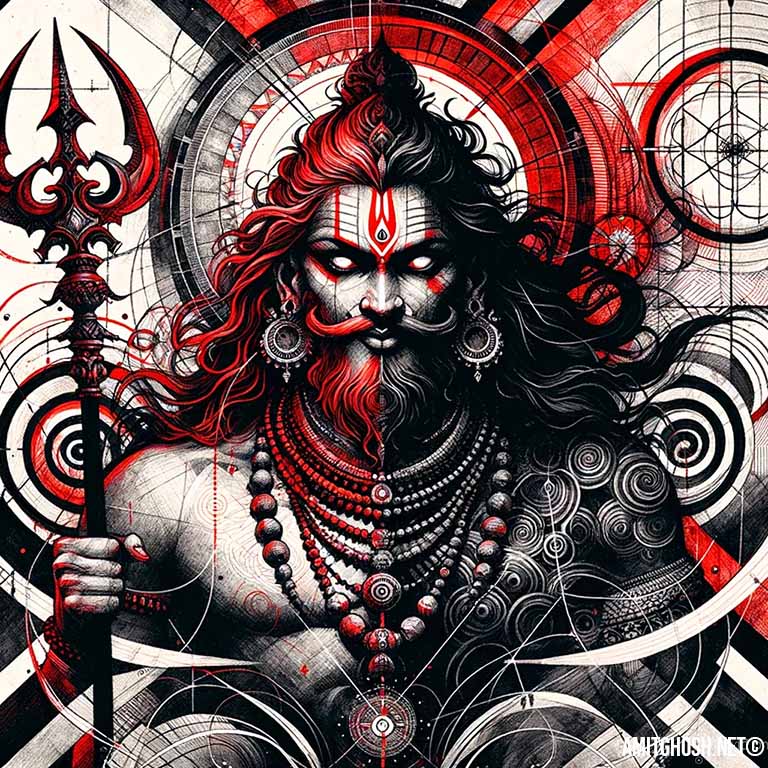
It was during these hallowed moments that the air would hum with the recitation of sacred verses, the glow of oil lamps cast dancing shadows on the walls, and the scent of incense would mingle with the crisp mountain air. Offerings of food, flowers, and fire were made, each a silent testament to a bond that spanned eons.
To the outside world, Kubja’s family seemed ordinary, but the flicker of knowing in their eyes spoke of deeper truths. In reverence to Unmatta Bhairava, they remained the silent keepers of a spiritual legacy, their devotion unwavering, their faith a silent river that flowed unseen. And so, the deity unknown to all but them continued to be worshipped in whispers and veiled in the sacred mists of Nepal.
What happened in Puri was not an accident.
Kubja’s family held a belief that was different from what most people thought. They didn’t see Lord Jagannath as a gentle form of Lord Vishnu, but as Kal Bhairav, a fierce and protective deity. In their eyes, Jagannath was a powerful guardian, someone who was originally much more intense and strong than the kinder version worshipped by others today.
विमला सा महादेवी जगन्नाथा तु भैरव ।
सृष्टिभूत महाशक्ति मणिपुर निवासिनी विमला सा पराशक्ति उड्डियान
शुद्धेश्वरी अंजुना देहि में देवी बहिरयोगे ममम्बिके माधवः भैरव साक्षात्
प्राणतोस्मि जगत्पते ।।
vimala sa mahadevi jagannatha tu bhairava.
srishtibhuta mahashakti manipura nivasini vimala sa
parashakti uddiyana pureshvari anjuna dehi me devi
bahiryoge mamambike madhavah bhairava sakshat
pranatosmi jagatpate.
In the ancient practice of Tantra, Jagannath represented Bhairava, and the goddess Bimala was his partner, Bhairavi. For them, Jagannath was the ultimate expression of this intense and protective force, Kal Bhairav, and over time, people had softened his image.
Tragedy struck when Kubja’s family went to visit the temple in Puri. They were killed under mysterious circumstances, and with their death, the sacred statue of Unmatta Bhairav that they guarded was stolen. This was no ordinary statue.
Every eight years their family has to visit Kal Bhairav i.e. Jagannath Temple with the idol of Unmatta Bhairava.
Altar
Unmatta Bhairava, known among the Bhairavas as the “Mad One”. He is a a deity shrouded in mystique and feared for his unpredictable fury and also revered as Chhetrapalaka, the guardian of the sacred Lord Pashupatinath. The Pashupatinath Temple, nestled in the heart of the Kathmandu Valley housed one of the few temples dedicated to Unmatta Bhairava.
Unmatta Bhairavais also known as Bhoot Damar is believed to be in control of all spirits, including the celestial dancers known as apsaras and the mystical entities called Yakshis. The sacred verses dedicated to him are chronicled in the Bhoot Damar Tantra. It is said to have the power to reach across the veil that separates the living from the dead. This esoteric knowledge is not found in mainstream religious texts and is often shrouded in secrecy.
Yakshis are fascinating beings from ancient stories. They’re not like the usual gods or demons you might hear about; they’re something else entirely—nature spirits. Both men and women, Yakshas and Yakshinis, are tied to the natural world, and often show up in all sorts of stories and myths, across different traditions like Hinduism, Buddhism, Jainism, and even Islam.
As the night draped itself in its most opaque cloak, the new moon vanishing from sight, Kubja stood by the Shiva Linga, her resolve as unshakable as the ancient stone itself. In the times of the Vedas, sacred geometry in the form of yantras was the conduit for the divine, long before idols took their place in temples. These mystical diagrams were keys to unfathomable spiritual energies, and among them, the yantra of Unmatta Bhairava was said to be so potent, so secretive, that not even the oldest scriptures dared to describe it.
Among the tumult, one stone, propelled by an unseen hand, found its mark with a cruel precision. It struck her cheek with the force of pent-up fury, carving a deep, grievous wound from which blood began to flow with relentless intensity. The stark red against her skin stood out, a vivid reminder of the brutality of the moment. But tonight, that same blood served a higher purpose. As the heavens opened and rain descended like a deluge, washing the world in its relentless downpour, Kubja began the ritual. With her blood, she traced the intricate geometry of the yantra upon the ground, each line a whisper of ancient power, each shape a bastion of forbidden knowledge.
Surrounding this sacred emblem were her offerings—a vivid collection that painted a picture of life and death in stark reds and somber blacks. Blood-red flowers, plucked for their color of vitality and sacrifice; the still form of her faithful dog, its spirit now a guardian in another realm; and ashes from the cremation ground, a reminder of the transience of life.
Kubja had also prepared incense, believed to be cherished by Unmatta Bhairava. She ignited them, and the scent rose high, an aromatic plea to the heavens. The air grew thick with the fragrance, mingling with the ozone scent of the storm, creating a tapestry of olfactory intensity.
The only light in this dark tableau came from the sacred fire that Kubja had kindled. The sacred fire before Kubja stood as a challenge to the storm, its flames defiantly reaching skyward, undeterred by the torrential downpour. Each raindrop that hit the flames hissed in defeat, evaporating instantly, as the fire cast a glow that fought back the encroaching shadows. It crackled and spat, its flames reaching skyward as if attempting to bridge the world of mortals with that of the gods. The shadows it cast were long and dramatic, flickering across the road turned river by the rain, a path that now seemed to lead to otherworldly domains.
In this charged atmosphere, where the elements themselves seemed to hold their breath, Kubja chanted the mantras passed down through her lineage, her voice steady and clear. It was a sound that seemed to resonate with the frequency of the earth itself, a sonorous bell cutting through the tempest’s roar.
This was a moment of convergence, of past and present, of pain and hope. Kubja was both the culmination of her family’s legacy and the solitary beacon for an future uncertain. In the heart of the storm, before the ancient Shiva Linga, she invoked Unmatta Bhairava, not just as a deity, but as a symbol of her unyielding spirit, her refusal to be broken by the cruelty of fate or man.

The Yakshis, ethereal and fierce, circled Kubja, their forms a blur of motion. They whispered secrets in a language forgotten by time, their words a symphony of chaos and harmony.
Chanting the Stotra, Kubja entered a trance. The world around her faded, leaving her in a space where time and reality warped under the weight of her intent. As she called out to Unmatta Bhairava, the air around the temple stirred, a low rumble echoing through the night as if the very earth was responding to her call.
A whirlwind of energy engulfed Kubja. A wild and untamed power that threatened to consume her. But Kubja stood firm, her heart open, offering her fears, her desires, and her ego as a sacrifice to the deity. She pleaded for his blessing, not for power or revenge, but for the strength to complete her transformation.
As the ritual reached its zenith, a silence enveloped the Shiva Linga, a calm after the storm. Kubja, her body and spirit pushed to the limits, collapsed before the Shiva Linga, her mind teetering on the brink of consciousness. It was then that she felt it—a touch, light as a feather, yet imbued with an indescribable power, on her forehead.
A mark appeared, the symbol of a small two-headed drum, Damaru.
Faces
Evening:
With the storm brewing, Devadatta raced against the looming threat of rain that threatened to muddy everything in its path. He saw Tilotamma playing with a dog on the street as he hurried by. Devadatta had noticed Tilotamma outside their home yesterday. Nowadays her daughter returns from paathsala with Tilotamma. Tilotamma, who had only been among them for a week, had already become a constant subject of her daughter’s lively discussions.
“Uncle, what’s going on? Why are you in such a hurry?” Tilotamma called out.
“I need to get somewhere quickly. You should head home; it looks like a storm is coming,” Devadatta yelled back, not slowing down. “By the way, have you seen Kabirajji around?”
Tilotamma shook her head. “No, Uncle, I haven’t.”
As Devadatta ran, something about the dog struck a chord in his memory. He paused for a moment, his thoughts racing. “Wait, isn’t that Kubja’s dog?” he wondered aloud, his heart skipping a beat.
But then he dismissed the thought as quickly as it came. “That can’t be right; Kubja’s dog is long dead. All the street dogs look the same,” he told himself, pushing forward.
There was something unmistakably recognizable about Tilotamma to Devadatta, as though she had stepped out of a distant memory from his early years. “Am I going crazy?” he questioned internally. It was understandable, considering the unsettling reality he had just faced in his own home.
Just then, a loud clap of thunder roared, and the skies opened up, drenching everything in heavy rain as he continued his rush to Kabirajji’s house.
Afternoon:
Devadatta was in high spirits. His day’s work had been more lucrative than usual. He and his crew had stumbled upon a treasure trove—a ship heavy with rice, spices, and glittering with the gold of a newlywed couple and their family’s jewels. Their attack was swift, leaving no room for screams or protests.
His joy, however, turned to dread as he returned home to find his wife unconscious near the cowshed. Rushing to her side, his concern deepened when he ventured into the cowshed. There, an eerie sight greeted him—a tree, out of place and time, stood where he usually fed the cows. Its roots sprawled across the ground, moving with a sinister, almost sentient, intention. It was as if the tree breathed, its roots pulsating, gripping the earth and the air with a life of their own.
Devadatta stood frozen, caught in the gaze of this unnatural entity. The tree, with its limitless roots, seemed to be at the center of a nightmare that had sprung to life, threatening to engulf everything in its path. The horror of the situation was raw, palpable, and entirely beyond comprehension, ensnaring Devadatta in a web of fear and disbelief.
The air felt thick and scary, with the tree’s roots moving in a way that made creepy shadows on the walls. Devadatta couldn’t move, staring at the weird tree. It was like something from a bad dream, with roots everywhere, looking like they could grab anything close. Devadatta was scared, not understanding how this could happen. Quickly, he picked up his unconscious wife and carried her back home. Then, he ran as fast as he could to get help.
Morning:
Kamini’s life in the paathsala took an unexpected turn with Tilotamma’s arrival. Tilotamma, with her ethereal beauty, became the center of everyone’s attention, igniting Kamini’s insecurities but also sparking an idea. If she could befriend Tilotamma, perhaps some of her secrets could help Kamini overcome her own perceived flaws. Kamini’s strategy was simple yet hopeful: to make Tilotamma her confidante, hoping that Tilotamma’s beauty secrets would be the solution she had been looking for.
Tilotamma, aware of her effect on people, remained humble and approachable, which made Kamini’s mission easier than expected. They quickly struck up a friendship, bonding over shared lessons and their curiosity about the world beyond the paathsala. Kamini admired Tilotamma not just for her looks but also for her wisdom and the way she carried herself with grace and dignity.

One morning, during the break between the classes in paathsala, under the shade of a sprawling banyan tree, Kamini mustered the courage to broach the subject of beauty with Tilotamma. Their conversation unfolded casually yet intimately, marking the beginning of a deep and meaningful friendship.
Kamini: (Excitedly) “Tilotamma, you always look so radiant! Is there a secret to your beauty?”
Tilotamma: (Smiling warmly) “Oh, Kamini! Beauty is more about how you feel inside. But yes, I do follow a simple ritual taught by my grandmother.”
Kamini: “Really? I’ve been trying so many things. What is it? I must know!”Tilotamma: “It’s quite basic, actually. Just sesame seeds mixed in bathwater. Immersing in it for a couple of hours leaves the skin unbelievably smooth.”
Kamini: “Sesame seeds? Really? But how do you even use them here without a bathtub?”
Tilotamma: “Oh, these aren’t your average sesame seeds. They’re sort of like my family’s secret superfood for the skin. Just soak them in water, and you’ve got yourself a spa.”
She reached into the small pouch she carried and drew out a handful of sesame seeds, their appearance ordinary yet somehow filled with promise. Tilotamma extended her hand towards Kamini, offering the seeds.
Kamini: (Holding the seeds, now curious) “Superfood for the skin? Sounds fancy. But seriously, how do you manage without a bathtub?”
Tilotamma: “Just gotta be creative. I use the cowshed. Clean out a spot, fill a basin with water, and mix in the seeds. It’s all about improvising.”
Kamini: “In the cowshed? That’s… actually pretty cool. Think I could try it out?”
Tilotamma: “Sure, but it’s something you gotta do on your own. It’s kinda personal, you know? I am not going to take bath with you. Kamini, remember, you are beautiful just the way you are…”
At Tilotamma’s words, Kamini blushed, the implication hitting her with a mix of embarrassment and realization. This journey was hers to take alone.
At Noon, In the Cowshed:
Excited by Tilotamma’s secret, Kamini couldn’t wait to share it with her mother, who found the whole idea charmingly naive yet endearing. She chuckled at the image of her daughter attempting such an unconventional beauty treatment in their cowshed, of all places. It was an innocent adventure, a sweet testament to Kamini’s quest for beauty.
Alone, Kamini approached the cowshed, a sense of adventure replacing her initial skepticism. The rustic smell of hay and earth filled her senses, grounding her in the moment. She prepared her makeshift bath, scattering the sesame seeds into the water, their gentle descent like a promise of the transformation to come.
As she tentatively soaked her hands, then her arms, feeling the silky water against her skin, Kamini couldn’t help but smile. There was something liberating about this simple act—alone, yet connected to generations of wisdom. It wasn’t just about the pursuit of beauty but about embracing herself fully, flaws and all.
Time, however, seemed to stretch on indefinitely. Kamini, fully absorbed in her new beauty ritual, remained sequestered in the cowshed far longer than her mother had anticipated. Concern began to nibble at her mother’s calm as the sun dipped lower, casting long shadows around their home.
“Kamini, are you alright?” her mother called out, her voice laced with a growing unease. Each time, the response was distracted, “Just a minute, Ma!” Yet, minutes turned to hours, and still, there was no sign of Kamini stepping out from her makeshift spa.
Unable to quell her worry any longer, her mother took decisive action, pushing open the door to the cowshed with a force born of fear. The sight that greeted her was one she could never have prepared for. There, amidst the dim light filtering through the slats, was Kamini, looking nothing short of distraught.
The sesame seeds, far from being the simple beauty supplement they were believed to be, had begun an eerie transformation. Tiny roots had emerged from them, weaving their way into Kamini’s skin, intertwining with her essence in a grotesque mimicry of nature’s embrace.
Kamini was cornered by her own reflection, a mirror propped against the wall as she desperately tried to remove the invading seeds with nothing but a piece of hay, her actions fueled by a frantic desire to reclaim her once unmarred skin. The horror of the situation was palpable, with Kamini’s mother frozen at the threshold, heartache and shock intermingling at the sight of her daughter’s anguish.
In the dim light of the cowshed, an eerie transformation unfolded, capturing Kamini’s mother in a vortex of disbelief. he spores, once seemingly inert, began to writz and swell grotesquely, transforming before her eyes. Her mother’s voice, a soft whisper of “Kamini,” was the last sound before silence took over; she fainted, overwhelmed by the sight.
Haunting
Upon their return, Devadatta and Kabirajji were greeted by an alarming sight: Devadatta’s cowshed was ablaze, with orange flames leaping into the sky. Fortunately, the cows were elsewhere, unharmed by the fire.
But the relief was overshadowed by a more pressing concern: Devadatta’s wife was mysteriously absent from the scene. Also, no one has seen her daughter Kamini either! Devadatta once vibrant with the dynamics of his supremacy, now trembled under the weight of fear and uncertainty.
A cold whisper hissed to Devadatta’s ears, chilling and clear, “You think you can challenge me?” He spun around, but there was nobody there. But where is he? Suddenly, he realized he was standing alone in the middle of a festival ground, a place that should have been bustling with people, yet it was completely empty. There are no people anywhere.
Across the deserted expanse, Devadatta caught sight of Tilotamma, her attention captured by a few dogs. She was the only other soul visible. Her back was turned opposite. She has not noticed Devadatta yet. “Perhaps I’m going insane,” he speculated internally. He stepped towards Tilotamma.
Then, in a moment that sent shivers down his spine, Tilotamma’s head twisted completely backward around in a way that heads shouldn’t twist, revealing eyes that were entirely white, without any hint of black in them—like ghostly orbs staring right through him.
Devadatta’s heart skipped a beat in sheer terror.
“Remember me?” The voice echoed again, a cold whisper that seemed to float directly into his ears, as if the speaker was standing just behind him, breath warm against his skin, a haunting intimacy that left him uneasy, looking over his shoulder into the empty air.
Before Devadatta’s disbelieving eyes, Tilotamma’s form began to twist, her features blurring in a nightmarish dance. She elongated, her bones cracking, reshaping into Kubja’s familiar silhouette, the girl all the village boys had adored, including Devadatta. But this was different; there were no signs of the white blisters that Kubja had. It was her, yet it was as if he was seeing her from a past memory.
Suddenly, Devadatta’s memory sharpened – Tilotamma was not a stranger. Tilotamma looks like Kubja from their days in the paathsala.

As she tilted her head, a chilling smile spread across her face, revealing teeth that seemed to belong to some nightmarish creature rather than a human. Dark, viscous liquid oozed between the sharp, uneven teeth, dripping onto the ground. In an instant, the figure blurred into motion, charging at Devadatta with a speed that seemed both unnatural and terrifying.
Devadatta’s skin was slick with sweat, his heart pounding against his ribs, as fear rooted him to the spot. The once-familiar figure was now a specter of horror, her approach heralding a terror Devadatta had never known.

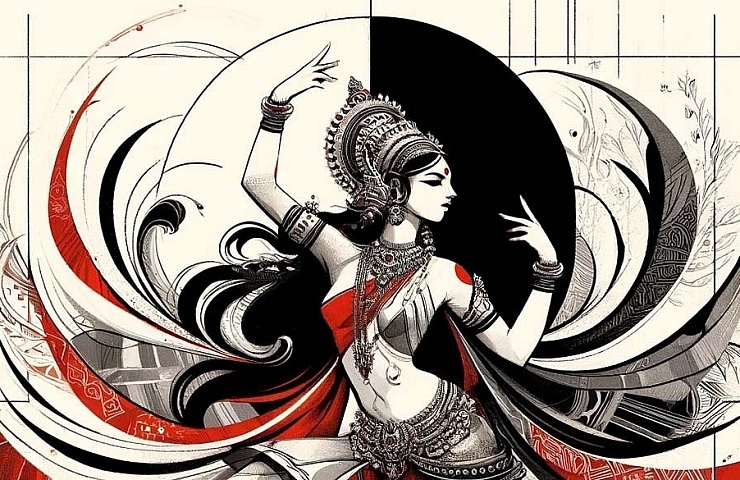
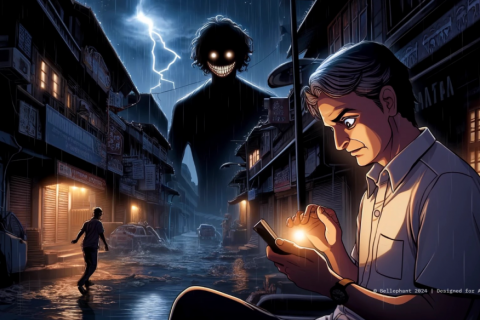
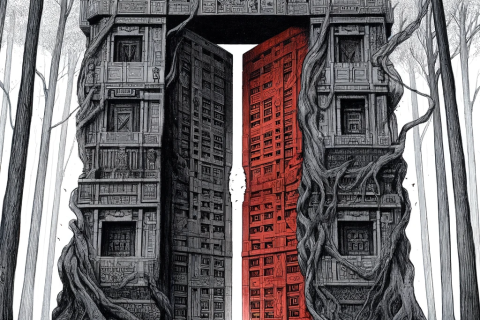








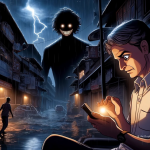

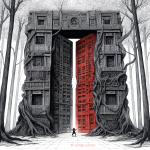

Leave a Reply